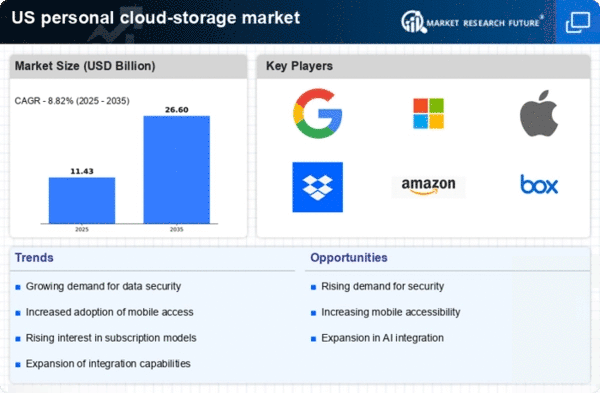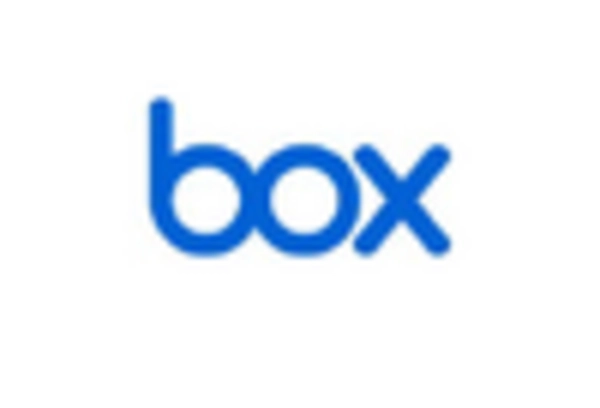Increased Data Generation
The personal cloud-storage market is experiencing a surge in demand driven by the exponential growth of data generation. With individuals creating vast amounts of data through various digital activities, the need for secure and accessible storage solutions has become paramount. In the US, it is estimated that the average person generates approximately 1.7 MB of data every second. This trend indicates a growing reliance on personal cloud-storage solutions to manage and store this data efficiently. As users seek to safeguard their digital assets, the personal cloud-storage market is expected to expand to meet the needs of consumers prioritizing data accessibility and security..
Shift Towards Remote Work
The shift towards remote work is significantly impacting the personal cloud-storage market. As more individuals work from home, the demand for reliable and accessible storage solutions has increased. In the US, remote work is projected to remain a prevalent trend, with approximately 30% of the workforce expected to work remotely by 2025. This shift necessitates the use of personal cloud-storage solutions that allow for easy collaboration and file sharing among remote teams. Consequently, the personal cloud-storage market is expected to grow as users seek solutions that enhance productivity and connectivity in a remote work environment..
Growing Mobile Device Usage
The proliferation of mobile devices is significantly influencing the personal cloud-storage market. As smartphones and tablets become ubiquitous, users increasingly require seamless access to their files across multiple devices. In the US, mobile device penetration is projected to reach over 90% by 2025, which suggests a heightened demand for cloud-storage solutions that facilitate easy file sharing and synchronization. This trend indicates that consumers are looking for personal cloud-storage options that integrate smoothly with their mobile ecosystems, thereby driving innovation and competition within the market. The personal cloud-storage market is likely to adapt to these changing consumer preferences.
Advancements in Cloud Technology
Technological advancements are playing a crucial role in shaping the personal cloud-storage market. Innovations such as artificial intelligence and machine learning are enhancing the functionality and efficiency of cloud-storage solutions. These technologies enable features like automated file organization and intelligent data retrieval, which appeal to users seeking convenience and efficiency. In the US, the adoption of advanced cloud technologies is expected to grow, with a projected market value of $100 billion by 2026. This growth indicates that the personal cloud-storage market is likely to evolve rapidly, driven by the integration of cutting-edge technologies that improve user experience and storage capabilities.
Rising Awareness of Data Privacy
In recent years, there has been a marked increase in consumer awareness regarding data privacy and security. This heightened consciousness is influencing the personal cloud-storage market as individuals seek solutions that offer robust security features. According to surveys, approximately 70% of US consumers express concerns about data breaches and unauthorized access to their personal information. This trend suggests that consumers are more inclined to choose personal cloud-storage providers that prioritize data protection and transparency. As a result, companies in the personal cloud-storage market are likely to enhance their security measures to meet the evolving expectations of privacy-conscious users.
















